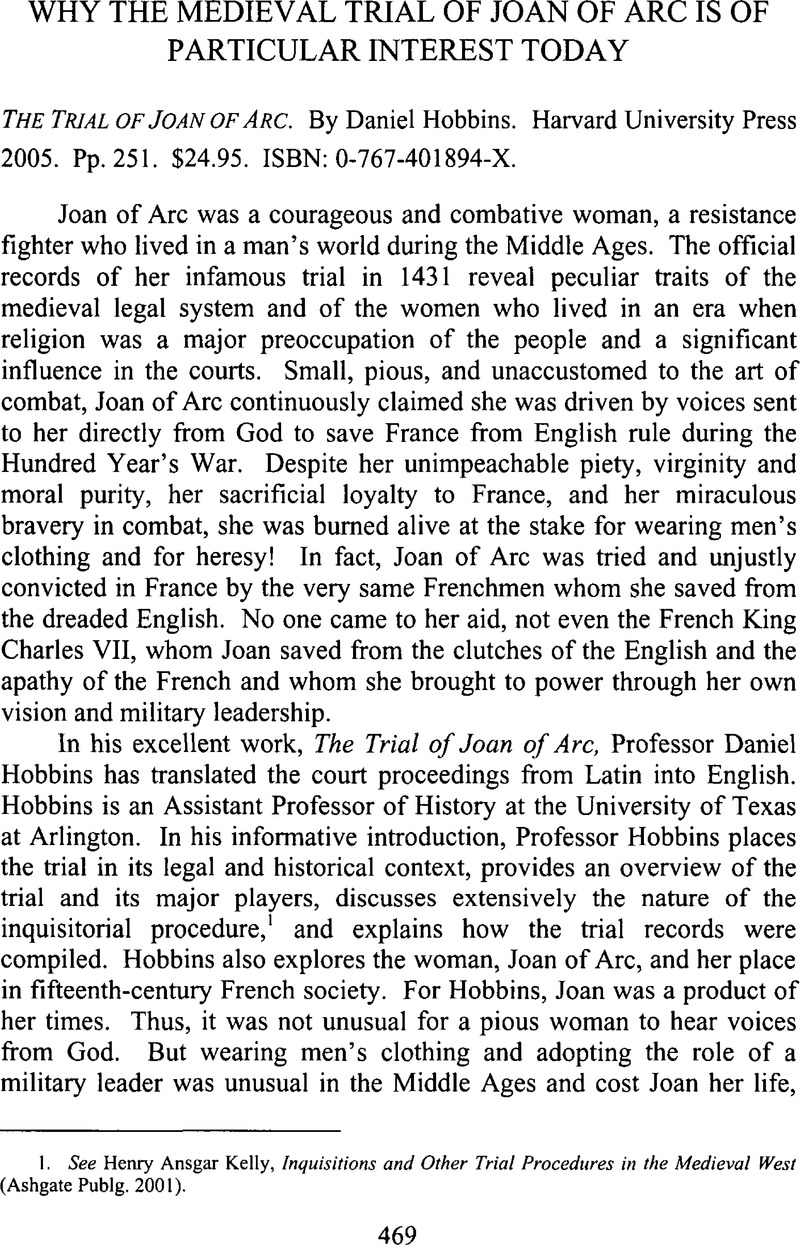No CrossRef data available.
Published online by Cambridge University Press: 24 April 2015

1. See Kelly, Henry Ansgar, Inquisitions and Other Trial Procedures in the Medieval West (Ashgate Publg. 2001)Google Scholar.
2. Sullivan, Karen, The Interrogation of Joan of Arc 149 (U. Minn. Press 1999)Google Scholar.
3. Two other versions of the French Minutes are available, one in French and one in English: La Minute francaise de l'Interrogatoire de Jeanne la Pucelle, d'après le réquisitoire de Jean d'Estivet et les manuscripts de d'Urfé et d'Orleans (Paul Doncoeur & Yvonne Lanhers eds., Melun, France: d'Argences 1952) and Walter Sidney Scotts, The Trial of Joan of Arc; Being the Verbatim Report of the Proceedings from the Orleans Manuscript (Associated Booksellers 1956).
4. See Tiefenbrun, Susan, Semiotics and Martin Luther King's “Letter from Birmingham Jail,” 4 Cardozo Stud. L. & Literature 255 (1992)CrossRefGoogle Scholar.
5. Karen Sullivan, supra n. 2.
6. Barrett, W.P., The Trial of Jeanne d'Arc 3 (Gotham House 1932)Google Scholar.
7. Shaw, George Bernard, Saint Joan: A Chronicle Play in Six Scenes and an Epilogue (Penguin Classics 2001)Google Scholar.
8. E.g. Braven, Jess, Leading The News: White House Will Reverse Policy Ban Evidence Induced by Torture, Wall St. J. A3 (Mar. 22, 2006)Google Scholar.
9. Canon law is defined as the legal institutions established by the Church in the twelfth to the sixteenth century. Canon law includes the law of elections, complex rules of clerical ordination, the remedy of restitution, the protection of the poor, the use of oaths and vows, the law of property and economy, the law of baptism, the crime of blasphemy (or heresy), the protection against double jeopardy, laws of papal privileges, the law of excommunication and religious discipline. Canon law was considered to be the law of love and was instituted in contrast to Roman civil law that was notorious in its brutality. See Review Essay: In the Steps of Gratian: Writing the History of Canon Law in the 1990s, 48 Emory L, J. 647 (1999)Google Scholar.
10. See generally Herrmann, Frank R. S.J., & Speer, Brownlow M., Facing the Accuser: Ancient and Medieval Precursors of the Confrontation Clause, 34 Va. J. Intl. L. 481 (1994)Google Scholar.
11. Silecchia, Lucia A., Things Are Seldom What They Seem: Judges and Lawyers in the Tales of Mark Twain, 35 Conn. L. Rev 559, 5599 (2003)Google Scholar.